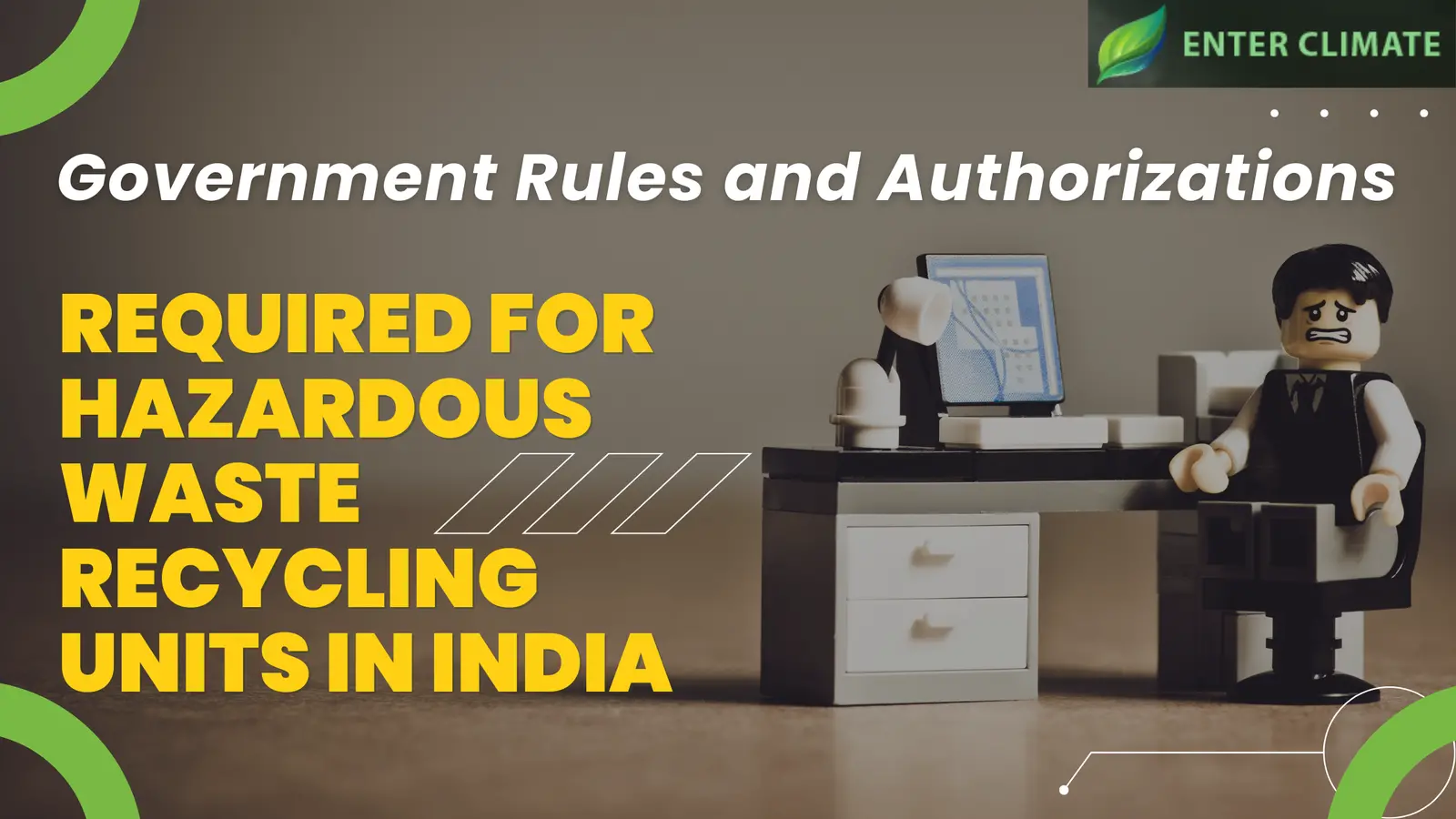We use cookies to personalise site content, social media features and to analyse our traffic. We also share information about your use of this site with our advertising and social media partners.
About Me
 Upendra Sharma
Upendra Sharma I’m Upendra Sharma, an environmental compliance consultant with Enterclimate. I support industries in obtaining authorizations, managing waste, and adopting eco-friendly practices. My mission is to simplify complex regulatory processes and drive sustainable growth
Posted by - Upendra Sharma -
on - Oct 22 -
Filed in - Business -
start hazardous waste recycling business start grain processing industry start paddy processing industry start flour mill business -
110 Views - 0 Comments - 0 Likes - 0 Reviews

Hazardous waste is any kind of waste that can be dangerous to people, animals, or the environment. It includes things like chemicals, batteries, electronic waste, paints, and industrial leftovers. Recycling these wastes is very important because it helps protect our environment, reduces pollution, and even saves resources. But running a hazardous waste recycling unit in India isn’t as simple as putting waste into a machine. There are strict rules and authorizations that businesses must follow to operate safely and legally.
In this article, we will explain all the government rules, permissions, and authorizations needed for setting up and running a hazardous waste recycling unit in India in simple words.
1. What is a Hazardous Waste Recycling Unit?
A hazardous waste recycling unit is a facility where dangerous waste is collected, processed, and converted into something safe or reusable. For example, old batteries can be recycled to extract metals like lead and zinc. Similarly, chemicals from industries can be treated so that they don’t harm people or nature.
These units play a very important role in keeping our environment clean, preventing soil and water pollution, and reducing the burden on landfills.
2. Why Government Rules Are Important
You might think, “Why can’t someone just start recycling hazardous waste?” The answer is simple: hazardous waste is dangerous. If it is not handled correctly, it can cause:
Air pollution from toxic fumes
Water contamination from chemicals
Fire or explosion hazards
Health risks for workers and nearby communities
That’s why the Indian government has strict rules under the Hazardous and Other Wastes (Management & Transboundary Movement) Rules, 2016. These rules make sure that hazardous waste is managed safely at every step – from collection to disposal or recycling.
3. Key Government Authorizations Required
If you want to start a hazardous waste recycling unit in India, you must get several permissions from authorities. Here’s a step-by-step guide:
Before starting operations, you must register your unit with the local State Pollution Control Board (SPCB) or Pollution Control Committee (PCC) (for Union Territories).
Why it’s needed: The board checks if your unit meets safety, environmental, and operational standards.
Documents required usually include:
Project plan or layout of the unit
List of hazardous wastes to be handled
Safety measures and emergency plan
Proof of land ownership or lease
b) Consent to Establish (CTE)
The Consent to Establish (CTE) is a permission from SPCB that allows you to build and set up your unit.
Key points:
Ensures your site meets environmental safety standards
Confirms your facility has proper machinery and storage for hazardous waste
Usually valid for 3–5 years
c) Consent to Operate (CTO)
Once your unit is ready, you must get a Consent to Operate (CTO) before starting work. This ensures your unit is safe to handle hazardous waste.
Important aspects checked:
Waste storage practices
Pollution control devices
Worker safety measures
Emergency and disposal plans
d) Authorization under Hazardous and Other Wastes Rules, 2016
All hazardous waste generators, transporters, and recyclers must have an Authorization under the 2016 Rules. This is issued by the SPCB.
Features of this authorization:
Lists the type of hazardous waste your unit can handle
Specifies storage, transportation, and disposal methods
Usually valid for 5 years
Without this authorization, handling hazardous waste is illegal.
e) Other Safety and Compliance Certificates
Apart from SPCB approvals, your unit may need:
Fire NOC from the local fire department
Factory License under the Factories Act, 1948
Insurance for workers and environmental liability
Employee safety training certificates
These extra measures ensure the unit is safe for workers and nearby communities.
4. Steps to Set Up a Hazardous Waste Recycling Unit
Here’s a simplified step-by-step process:
Identify the type of waste you want to recycle.
Prepare a project report including waste types, machinery, site, and budget.
Get land and build infrastructure according to environmental standards.
Apply for CTE (Consent to Establish) from SPCB.
Install machinery and safety equipment.
Apply for CTO (Consent to Operate).
Apply for Hazardous Waste Authorization under 2016 rules.
Train workers in safety procedures and emergency handling.
Start operations legally while following all waste management and reporting rules.
5. Responsibilities of a Hazardous Waste Recycling Unit
Once operational, your unit must follow certain responsibilities:
Maintain a record of all hazardous waste received, processed, and disposed.
Ensure proper labeling, storage, and handling of waste.
Report monthly or annually to SPCB about waste processing and disposal.
Take safety measures for workers and surrounding areas.
Follow environmentally friendly recycling methods.
6. Common Mistakes to Avoid
Many new entrepreneurs make mistakes such as:
Operating without proper authorization
Mixing hazardous waste with normal waste
Ignoring worker safety
Failing to report waste records to SPCB
Avoiding these mistakes keeps your unit legal, safe, and trustworthy.
7. Benefits of Following Rules and Authorizations
Legal safety: Avoid fines and legal issues.
Worker protection: Safe working conditions prevent accidents.
Environmental protection: Less pollution, cleaner air, and water.
Business credibility: Clients and investors trust certified and authorized units.
8. FAQs (Frequently Asked Questions)
Q1: What is hazardous waste?
A: Hazardous waste is any waste that can harm people, animals, or the environment, like chemicals, batteries, or industrial leftovers.
Q2: Do I need government permission to recycle hazardous waste?
A: Yes. You must get authorization from the State Pollution Control Board and other necessary approvals like CTE and CTO.
Q3: How long does it take to get authorization?
A: Usually, it can take 2–6 months depending on the documents and inspection process.
Q4: Can I recycle all types of hazardous waste in one unit?
A: No. Your authorization will specify which types of waste your unit can handle.
Q5: Is worker safety important in hazardous waste units?
A: Absolutely. Workers must wear protective gear and follow safety procedures to prevent accidents.
Q6: What if I operate without authorization?
A: Operating without authorization is illegal and can result in heavy fines or even imprisonment.
Author Profile
Upendra Sharma is an environmental consultant and writer with over 10 years of experience in waste management and recycling in India. He has helped numerous businesses set up hazardous and biomedical waste recycling units while ensuring compliance with government rules. Upendra believes in spreading knowledge about safe and sustainable waste practices in a simple way that everyone can understand.

“To assist disaster survivors by providing a source for them to come together in time of need, to aid in the listing of events, information and other forms of assistance, and continuing support through the recovery process.”
Share this page with your family and friends.